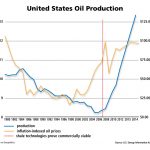
Decades of poor decision-making in Buenos Aires vividly demonstrate how politics do matter, and how – populist policies have continually stymied Argentina’s development, reducing it to a backwater rump mired in debt.
Things are about to improve, however. In late 2015 a new government rose to power, pledging to return Argentina to a saner form of government. That government has plenty of tools to work with:
Argentina boasts some of the best geography in the world. Unlike neighboring Brazil and Chile, Argentina’s vast arable lands and extensive riverine transportation network could situate Buenos Aires as the leader of not only the Southern Cone, but South America. It even boasts large and easily-accessible shale reserves. With a few policy tweaks Argentina’s geography will do most of the work, and the country could re-emerge as one of the world’s top ten exporters of wheat, corn, soy, beef, pork, and natural gas in as little as five years.
But even if Argentina’s political class fails to rise to the challenge, the country’s future is still bright. The country faces no security threats, largely due to the huge distances between it and places like the Middle East or China. In the new era such isolation is a perk rather than a hurdle. More importantly, as global trade slows and becomes more dangerous, the world will enter an era where rule-of-law breaks down, where financing is hard to come by, where international connections become weak and intermittent and where political stability is a rare commodity. Put simply, the world will look a lot like Argentina – and if there are any people who know how to navigate in such an environment, it is the Argentines.



